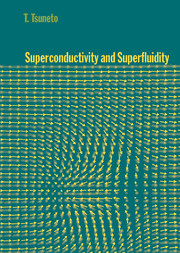Book contents
- Frontmatter
- Contents
- Preface
- Preface to the second edition
- 1 Superconductivity and superfluidity
- 2 Mean-field theory of pair condensation
- 3 BCS theory
- 4 Superconductivity due to electron–phonon interaction
- 5 Ginzburg–Landau theory
- 6 Superfluid 3He
- 7 New superconducting materials
- Appendix 1 Bose–Einstein condensation in polarised alkaline atoms
- Appendix 2 Recent developments in research on high temperature superconductors
- References and bibliography
- Index
5 - Ginzburg–Landau theory
Published online by Cambridge University Press: 23 December 2009
- Frontmatter
- Contents
- Preface
- Preface to the second edition
- 1 Superconductivity and superfluidity
- 2 Mean-field theory of pair condensation
- 3 BCS theory
- 4 Superconductivity due to electron–phonon interaction
- 5 Ginzburg–Landau theory
- 6 Superfluid 3He
- 7 New superconducting materials
- Appendix 1 Bose–Einstein condensation in polarised alkaline atoms
- Appendix 2 Recent developments in research on high temperature superconductors
- References and bibliography
- Index
Summary
The Ginzburg–Landau (GL) theory has been employed for general analysis of the physical properties of an ordered phase. This theory is especially useful when the system under consideration has a spatial variation, due to an applied external field for example. It should also be noted that this theory serves as a basis for studying the effects of fluctuations, that are neglected in the mean-field approximation. The GL theory was proposed before the microscopic theory of superconductivity by BCS and has played an important rôle in the analysis of superconducting phenomena even after the emergence of BCS theory. In the present chapter, the time-independent GL theory and its applications are first discussed; its extensions and the effect of fluctuations are then considered.
GL theory of superconductivity
The free energy Fs of the system is not only a function of the temperature T and other ordinary thermodynamic variables but a function (in fact, a functional in general since we are dealing with a system with spatial variations) of the order parameter. The order parameter of a spin-singlet s-wave superconductor is the pair wave function Ψ(x) = 〈ψ↑(x)ψ↓(x)〉, which is equivalent to the gap parameter Δ(x) = gΨ(x) in the BCS model. Here the order parameter is written Ψ(x) including a multiplicative constant. Let us write the free energy as Fs = Fs({Ψ(x)}), where such variables as T and V are and will be dropped to simplify the notation.
- Type
- Chapter
- Information
- Superconductivity and Superfluidity , pp. 100 - 126Publisher: Cambridge University PressPrint publication year: 1998



